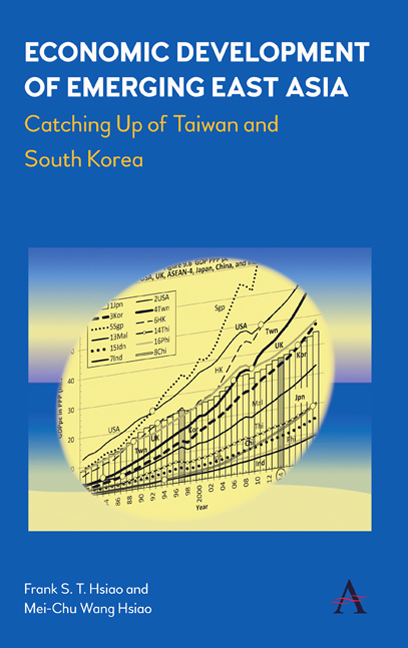Book contents
- Frontmatter
- Dedication
- Contents
- List of Figures
- List of Tables
- Sources of the Chapters
- Acknowledgments
- About the Authors
- Introduction
- Part I Studies of Emerging East Asian Economies: Taiwan and Korea
- 1 Some Development Indicators of Taiwan: A Comparative Study of East Asia in the Early Postwar Period
- 2 Capital Flows and Exchange Rates during the Asian Financial Crisis: Recent Korean and Taiwanese Experiences and Challenges
- 3 Productivity Growth in Newly Developed Countries: The Case of Korea and Taiwan
- 4 Korean and Taiwanese Productivity Performance: Comparisons at Matched Manufacturing Levels
- 5 Colonialism, Learning and Convergence: A Comparison of India and Taiwan
- Part II Catching Up and Convergence in East Asian Economic Growth
- Index
5 - Colonialism, Learning and Convergence: A Comparison of India and Taiwan
from Part I - Studies of Emerging East Asian Economies: Taiwan and Korea
Published online by Cambridge University Press: 10 January 2018
- Frontmatter
- Dedication
- Contents
- List of Figures
- List of Tables
- Sources of the Chapters
- Acknowledgments
- About the Authors
- Introduction
- Part I Studies of Emerging East Asian Economies: Taiwan and Korea
- 1 Some Development Indicators of Taiwan: A Comparative Study of East Asia in the Early Postwar Period
- 2 Capital Flows and Exchange Rates during the Asian Financial Crisis: Recent Korean and Taiwanese Experiences and Challenges
- 3 Productivity Growth in Newly Developed Countries: The Case of Korea and Taiwan
- 4 Korean and Taiwanese Productivity Performance: Comparisons at Matched Manufacturing Levels
- 5 Colonialism, Learning and Convergence: A Comparison of India and Taiwan
- Part II Catching Up and Convergence in East Asian Economic Growth
- Index
Summary
Abstract
Before World War II, Taiwan was a colony of Japan, and India was a colony of the United Kingdom. This chapter is unique and different from other chapters in that we compares the colonial experiences of Taiwan and India before World War II and their effects on the economic development of the postwar period. The chapter combines the traditional learning model with recent theory of economic growth using Maddison's long-run real GDP per capita data.
We first discuss the performance of India and Taiwan in the world economy. While economic theory suggests that, due to its large area and population, India could have grown faster than Taiwan, this was not the case after World War II. We identify differences in terms of learning in the development experience of the two countries under colonial rule. The colonial distortion in industrial and agricultural development appeared to be more important in India than in Taiwan. It appears that the most important factors, however, were health and education.
We then derive learning coefficients of India with the United Kingdom, Taiwan with Japan, and Japan with the United States through the prewar and postwar periods. Long-run coefficients of learning are estimated. Using the conventional unit root– based test of convergence, we show that the model of learning leads to a logistic model of economic growth. We then confirm that real GDP per capita of Taiwan was converging to that of Japan, whereas that of India showed only slight convergence to the United Kingdom or Taiwan. Our results underscore the importance of studying colonial experiences of the two countries, and for that matter, of any country in order to understand its postwar economic development.
Introduction
The study of the economic convergence of developing to developed countries as well as the convergence of some developed countries to dominant developed countries, such as the United States, is one of the most intriguing and difficult matters in the recent literature on economic growth and development. Few works, however, have focused on whether former colonies could catch up with the colonizer country once the colony achieved independence and cast off colonial institutions deemed inimical to economic development.
- Type
- Chapter
- Information
- Economic Development of Emerging East AsiaCatching Up of Taiwan and South Korea, pp. 119 - 154Publisher: Anthem PressPrint publication year: 2017

